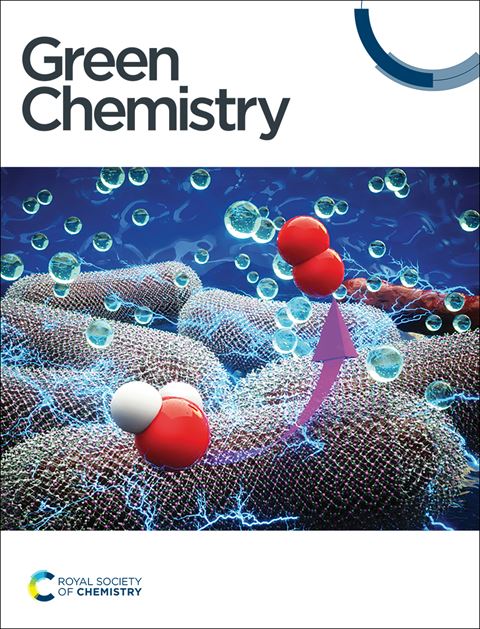High-performance fully bio-based dynamic covalent supramolecular epoxy resin: synthesis and properties†
IF 9.3
1区 化学
Q1 CHEMISTRY, MULTIDISCIPLINARY
引用次数: 0
Abstract
Bio-based dynamic covalent thermosets have attracted widespread attention due to their potential to reduce dependence on fossil resources and address recycling issues after disposal. However, a longstanding challenge has been reconciling the use of bio-based raw materials with high-performance properties. To address this issue, we designed a method for preparing a fully bio-based dynamic covalent supramolecular epoxy resin, utilizing the reactive carbonyl and carboxyl groups of levulinic acid. Even with a relatively low crosslinking density (3152 mol m−3), the resin exhibits a glass transition temperature (Tg) of 164 °C, tensile strength of 111 MPa, and tensile modulus of 1864 MPa. In comparison, a resin cured with the commercial hardener DDM, which has a crosslinking density of 8855 mol m−3, displays a Tg of 167 °C, tensile strength of 86 MPa, and tensile modulus of 1278 MPa. Furthermore, the resin demonstrates reprocessability without the need for a catalyst. Benefiting from the dynamic effects of ester bonds within the network, the closed-loop chemical recovery of resin was confirmed. Additionally, the resin can be degraded in an alkaline environment, allowing for the recovery of the starting monomer, furandimethyl acid. This high-performance bio-based material is easy to synthesize and can be closed-loop recycled, providing a new strategy for the green development of high-performance thermosets.

高性能全生物基动态共价超分子环氧树脂:合成与性能
生物基动态共价热固性材料由于具有减少对化石资源依赖和解决处置后回收问题的潜力而受到广泛关注。然而,一个长期存在的挑战是如何调和生物基原材料与高性能的使用。为了解决这一问题,我们设计了一种利用乙酰丙酸的活性羰基和羧基制备全生物基动态共价超分子环氧树脂的方法。即使交联密度较低(3152 mol m−3),树脂的玻璃化转变温度(Tg)为164℃,拉伸强度为111 MPa,拉伸模量为1864 MPa。用DDM固化的树脂,交联密度为8855 mol m−3,Tg为167℃,抗拉强度为86 MPa,拉伸模量为1278 MPa。此外,该树脂无需催化剂即可再加工。利用网络内酯键的动态效应,证实了树脂的闭环化学回收。此外,该树脂可以在碱性环境中降解,允许回收起始单体呋喃二甲基酸。这种高性能的生物基材料易于合成,可闭环回收,为高性能热固性材料的绿色发展提供了新的策略。
本文章由计算机程序翻译,如有差异,请以英文原文为准。
求助全文
约1分钟内获得全文
求助全文
来源期刊

Green Chemistry
化学-化学综合
CiteScore
16.10
自引率
7.10%
发文量
677
审稿时长
1.4 months
期刊介绍:
Green Chemistry is a journal that provides a unique forum for the publication of innovative research on the development of alternative green and sustainable technologies. The scope of Green Chemistry is based on the definition proposed by Anastas and Warner (Green Chemistry: Theory and Practice, P T Anastas and J C Warner, Oxford University Press, Oxford, 1998), which defines green chemistry as the utilisation of a set of principles that reduces or eliminates the use or generation of hazardous substances in the design, manufacture and application of chemical products. Green Chemistry aims to reduce the environmental impact of the chemical enterprise by developing a technology base that is inherently non-toxic to living things and the environment. The journal welcomes submissions on all aspects of research relating to this endeavor and publishes original and significant cutting-edge research that is likely to be of wide general appeal. For a work to be published, it must present a significant advance in green chemistry, including a comparison with existing methods and a demonstration of advantages over those methods.
 求助内容:
求助内容: 应助结果提醒方式:
应助结果提醒方式:


